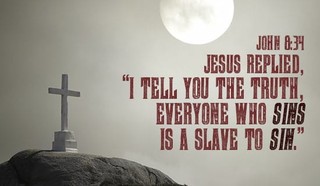- Recent Translations
- All Translations
John 8
Share
Settings
John 8 Commentary
Chapter 8
The Pharisees and the adulteress. (1-11) Christ's discourse with the Pharisees. (12-59)
Verses 1-11 Christ neither found fault with the law, nor excused the prisoner's guilt; nor did he countenance the pretended zeal of the Pharisees. Those are self-condemned who judge others, and yet do the same thing. All who are any way called to blame the faults of others, are especially concerned to look to themselves, and keep themselves pure. In this matter Christ attended to the great work about which he came into the world, that was, to bring sinners to repentance; not to destroy, but to save. He aimed to bring, not only the accused to repentance, by showing her his mercy, but the prosecutors also, by showing them their sins; they thought to insnare him, he sought to convince and convert them. He declined to meddle with the magistrate's office. Many crimes merit far more severe punishment than they meet with; but we should not leave our own work, to take that upon ourselves to which we are not called. When Christ sent her away, it was with this caution, Go, and sin no more. Those who help to save the life of a criminal, should help to save the soul with the same caution. Those are truly happy, whom Christ does not condemn. Christ's favour to us in the forgiveness of past sins should prevail with us, Go then, and sin no more.
Verses 12-16 Christ is the Light of the world. God is light, and Christ is the image of the invisible God. One sun enlightens the whole world; so does one Christ, and there needs no more. What a dark dungeon would the world be without the sun! So would it be without Jesus, by whom light came into the world. Those who follow Christ shall not walk in darkness. They shall not be left without the truths which are necessary to keep them from destroying error, and the directions in the way of duty, necessary to keep them from condemning sin.
Verses 17-20 If we knew Christ better, we should know the Father better. Those become vain in their imaginations concerning God, who will not learn of Christ. Those who know not his glory and grace, know not the Father that sent him. The time of our departure out of the world, depends upon God. Our enemies cannot hasten it any sooner, nor can our friends delay it any longer, than the time appointed of the Father. Every true believer can look up and say with pleasure, My times are in thy hand, and better there than in my own. To all God's purposes there is a time.
Verses 21-29 Those that live in unbelief, are for ever undone, if they die in unbelief. The Jews belonged to this present evil world, but Jesus was of a heavenly and Divine nature, so that his doctrine, kingdom, and blessings, would not suit their taste. But the curse of the law is done away to all that submit to the grace of the gospel. Nothing but the doctrine of Christ's grace will be an argument powerful enough, and none but the Spirit of Christ's grace will be an agent powerful enough, to turn us from sin to God; and that Spirit is given, and that doctrine is given, to work upon those only who believe in Christ. Some say, Who is this Jesus? They allow him to have been a Prophet, an excellent Teacher, and even more than a creature; but cannot acknowledge him as over all, God blessed for evermore. Will not this suffice? Jesus here answers the question. Is this to honour him as the Father? Does this admit his being the Light of the world, and the Life of men, one with the Father? All shall know by their conversion, or in their condemnation, that he always spake and did what pleased the Father, even when he claimed the highest honours to himself.
Verses 30-36 Such power attended our Lord's words, that many were convinced, and professed to believe in him. He encouraged them to attend his teaching, rely on his promises, and obey his commands, notwithstanding all temptations to evil. Thus doing, they would be his disciples truly; and by the teaching of his word and Spirit, they would learn where their hope and strength lay. Christ spoke of spiritual liberty; but carnal hearts feel no other grievances than those that molest the body, and distress their worldly affairs. Talk to them of their liberty and property, tell them of waste committed upon their lands, or damage done to their houses, and they understand you very well; but speak of the bondage of sin, captivity to Satan, and liberty by Christ; tell of wrong done to their precious souls, and the hazard of their eternal welfare, then you bring strange things to their ears. Jesus plainly reminded them, that the man who practised any sin, was, in fact, a slave to that sin, which was the case with most of them. Christ in the gospel offers us freedom, he has power to do this, and those whom Christ makes free are really so. But often we see persons disputing about liberty of every kind, while they are slaves to some sinful lust.
Verses 37-40 Our Lord opposed the proud and vain confidence of these Jews, showing that their descent from Abraham could not profit those of a contrary spirit to him. Where the word of God has no place, no good is to be expected; room is left there for all wickedness. A sick person who turns from his physician, and will take neither remedies nor food, is past hope of recovery. The truth both heals and nourishes the hearts of those who receive it. The truth taught by philosophers has not this power and effect, but only the truth of God. Those who claim the privileges of Abraham, must do Abraham's works; must be strangers and sojourners in this world; keep up the worship of God in their families, and always walk before God.
Verses 41-47 Satan prompts men to excesses by which they murder themselves and others, while what he puts into the mind tends to ruin men's souls. He is the great promoter of falsehood of every kind. He is a liar, all his temptations are carried on by his calling evil good, and good evil, and promising freedom in sin. He is the author of all lies; whom liars resemble and obey, with whom all liars shall have their portion for ever. The special lusts of the devil are spiritual wickedness, the lusts of the mind, and corrupt reasonings, pride and envy, wrath and malice, enmity to good, and enticing others to evil. By the truth, here understand the revealed will of God as to the salvation of men by Jesus Christ, the truth Christ was now preaching, and which the Jews opposed.
Verses 48-53 Observe Christ's disregard of the applause of men. those who are dead to the praises of men can bear their contempt. God will seek the honour of all who do not seek their own. In these verses we have the doctrine of the everlasting happiness of believers. We have the character of a believer; he is one that keeps the sayings of the Lord Jesus. And the privilege of a believer; he shall by no means see death for ever. Though now they cannot avoid seeing death, and tasting it also, yet they shall shortly be where it will be no more forever, ( Exodus 14:13 ) .
Verses 54-59 Christ and all that are his, depend upon God for honour. Men may be able to dispute about God, yet may not know him. Such as know not God, and obey not the gospel of Christ, are put ( 2 Thessalonians. 1:8 ) earnestly desire to know more of him. Those who discern the dawn of the light of the Sun of Righteousness, wish to see his rising. "Before Abraham was, I AM." This speaks Abraham a creature, and our Lord the Creator; well, therefore, might he make himself greater than Abraham. I AM, is the name of God, Ex. 3:14 ; it speaks his self-existence; he is the First and the Last, ever the same, ( Revelation 1:8 ) . Thus he was not only before Abraham, but before all worlds, ( Proverbs 8:23 , John 1:1 ) . As Mediator, he was the appointed Messiah, long before Abraham; the Lamb slain from the foundation of the world, ( Revelation 13:8 ) . The Lord Jesus was made of God Wisdom, Righteousness, Sanctification, and Redemption, to Adam, and Abel, and all that lived and died by faith in him, before Abraham. The Jews were about to stone Jesus for blasphemy, but he withdrew; by his miraculous power he passed through them unhurt. Let us stedfastly profess what we know and believe concerning God; and if heirs of Abraham's faith, we shall rejoice in looking forward to that day when the Saviour shall appear in glory, to the confusion of his enemies, and to complete the salvation of all who believe in him.


